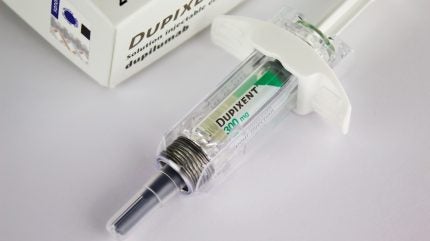
Regeneron and Sanofi’s Dupixent (dupilumab) has gained approval to treat chronic spontaneous urticaria (CSU) in Europe, adding yet another indication to the blockbuster anti-inflammatory drug.
The European Commission’s (EC) decision to authorise the monoclonal antibody (mAb) for moderate-to-severe CSU marks the first targeted medicine to be approved for the skin condition in over a decade.

Discover B2B Marketing That Performs
Combine business intelligence and editorial excellence to reach engaged professionals across 36 leading media platforms.
CSU patients who are aged 12 years and above with inadequate response to histamine-1 antihistamines (H1AH) and are naïve to anti-immunoglobulin E (IgE) therapy will be eligible for the therapy.
CSU is a chronic, inflammatory skin disease that causes sudden hives and recurring itchiness. The condition is typically treated with H1AH, which targets H1 receptors on cells to control symptoms such as itchiness and urticaria.
Regeneron said that Dupixent’s availability for the disease will help patients whose symptoms are not controlled by H1AH treatments. According to the pharma company, 270,000 people in the EU aged 12 years and older suffer from CSU that is inadequately controlled by antihistamines.
Regeneron’s chief scientific officer George Yancopoulos said: “Physicians now have a new approach for CSU with Dupixent, as the only treatment that inhibits IL-4 and IL-13, two key drivers of type 2 inflammation, and can offer patients significant improvement in debilitating itch and hives.”

US Tariffs are shifting - will you react or anticipate?
Don’t let policy changes catch you off guard. Stay proactive with real-time data and expert analysis.
By GlobalDataThe previous targeted treatment greenlit in Europe for this disease area was Xolair (omalizumab), which received approval for antihistamine-unresponsive CSU patients aged 12 years and older in 2014. A later label update for Xolair’s self-administration came in 2018.
Dupixent’s CSU indication in Europe follows a similar outcome in the US earlier this year. The US Food and Drug Administration (FDA) approved the immunotherapy for the same population of CSU patients in April 2025.
In the Phase III LIBERTY-CSU CUPID study (NCT04180488), Dupixent, when given as an add-on therapy to standard-of-care (SOC) antihistamines, significantly reduced itch and hives. This was compared to antihistamines alone after 24 weeks of treatment.
In Europe, Dupixent is approved for several chronic inflammatory conditions, including atopic dermatitis (AD), asthma, and eosinophilic esophagitis, amongst others. Soaring sales for Dupixent meant Sanofi and Regeneron, who co-market the drug, enjoyed strong Q3s. Quarterly sales for the immunotherapy increased by 26.2% to €4.2bn, meaning the mAb broke the €4bn ceiling for the first time in a single quarter.
Dupixent is set to continue providing a major revenue stream for the two companies, forecast to generate global sales of $25.4bn in 2031, according to GlobalData’s Pharma Intelligence Center.
GlobalData is the parent company of Pharmaceutical Technology.




